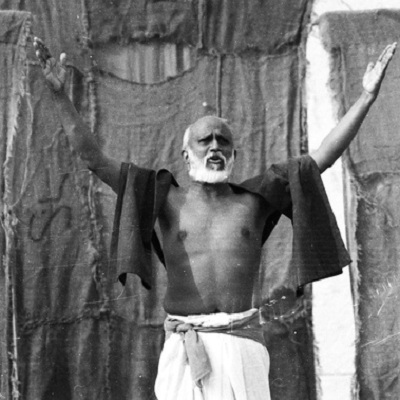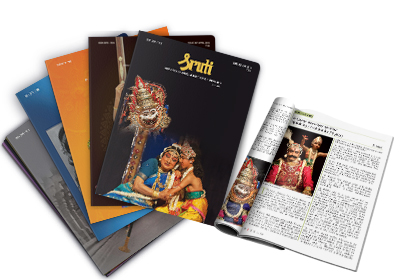
A short interview with T.K Soman, veteran actor and singer, Jana Natya Manch and Jansanskriti, Delhi
e-rang: You have been working as an actor for over 2 decades, tell us something about your early days, where did you grow up and how did you start doing theatre?
S: I was born in Kodungallur, Kerala in March 1951. I was born in a very poor family. My father was a tailor and my mother a weaver, she made mats with cocnut fibres. I often helped her. In fact my village was a very simple one. My father was the first generation tailor in the village, you see in those days men in my village didn’t wear shirts, nor any other stitched garments. It was an interesting time, just a few years after independent India took charge of herself. The workers movement was strong in Kerala and most of my childhood memories are submerged in stories of struggle and the way workers empowered each other. I still remember, my father was closely associated with the worker’s revolution. In fact we did not have a house of our own, we lived in a house given to us by a worker's organization where my maternal grandfather worked.
Kodungallur is in coastal Kerala, it’s a very historic place. This is where the first mosque was built in India- it’s a traditional Kerala building, very differant from how mosque look in north India. The coastline was famous for the visits of St. Thomas and also known for very early trade routes and other mythological stories. I was really very proud of my village, I still am, it gave me my grounding.
I did not have any formal education in theatre as a child. In fact, the first time I saw an English book was when I was in class V. I was really very excited to read English, it was a new thing for me. It made me proud that I could read other languages than Malayalam too. But truly speaking, my first trials in theatre were when I used to tell small lies to my mother like most kids do! so it came quite naturally.I formally started acting in plays in my school days. I was often picked up for acting with my teachers. I played many female roles in plays put up by the village theatre clubs.
In January 1968 I moved to Mumbai to join as an apprentice in the Naval Dockyard of Bombay. In Mumbai I did not do much theatre. It was only when I moved to Delhi did it all begin.
e-rang: When did you come to Delhi? And who did you work with in the beginning?
S: I came to Delhi In March 1973 on my transfer from Bombay (Mumbai). I worked with some Malayalee organisations here like the Delhi Malayalee Association and Malayalee Samajam. Malayalee Smajam still exists, it’s a 54 year old organization and does very good work, now they also have a building in Delhi. In fact when I got this award they also felicitated me. I acted in 3 plays few plays with them, can’t really remember what they were, it has been a while.
But I remember that here I met Mr. KP Appachan, a theatre enthusiast. Appachan was a very close theatre friend I got here in Delhi. He is a great writer and has written many short stories, plays and a book on chess in Malayalam. In fact it was the first book in Malayalam on Chess. He has many awards to his credit. He got an awarad from All india Radio for his play mrityuvarma.
Appachan re-kindled my interest in theatre. After that along with some other friends, we formed a group and started doing Malayalam plays. Later we got few more friends to join us that led to formation of a new group called Arangu. We produced few classics of the great playwrights of Malayayalam like CJ Thomas, CN Sreekanthan Nair and G. Sankara Pllai. We also played some plays written by my mentor, Mr. Appachan, I still meet him, he lives in Kozhikode. Our group Arangu did its last play, 'Waiting for Godot' (Malayalam translation) in the year 1986. In mid eighties I started working with Jansanskriti, the Malayalee progressive cultural organization in Delhi. I still do Malayalam theatre with them. I have dual loyalty to Janam and Jansanskriti and I get a chance to perform in both languages, which is great.
e-rang: When did you join Jana Natya Manch? What were your early experiences with Janam, did you travel a lot, what sort of plays did you do?
S: I count myself in Janam since 1986. I was introduced to Safdar Hashmi during the centenary celebrations of May Day that year (1st May). Safdar translated a KSSP (Kerala Shastra Sahitya Parishad) Play, Ek Sawal for Jansanskriti. The play talked about workers and their struggle. At this time I was already with Jansanskriti. Jansanskriti did that play along side Mai Diwas ki Kahani, a popular production by Janam to celebrate the centenary of May Day. Since then I started coming to Janam and participated in some of the workshops.
The first play I did with Janam was Moteram ka Satyagrah, which was a proscenium play and was performed for Premchand Samaroh organized by Janam in 1988.This play was a joint effort of Safdar and Habib Tanveer, so, clearly it was a one of a kind experience for me had heard much about Habib Sahab and was very nervous that I had to work with him. At that time my Hindi language skills were very poor. I remember how Moloyashree Hashmi (Now the President of Janam) helped me immensely in reading the play. I really found a great inspiration in her. Her dedication to Jana Natya Manch and her work for the Communist movement is unparalleled and I have great regards for her. Since then I started coming to Janam regularly and have been acting in almost all the productions of Janam. I have travelled a lot with Janam. Janam has taken me to various parts of the country which has been a huge learning experience.
I remember, Habib Sahab had fondly said to me ‘ Somaaan, tumhara chehra bahut khubsurat hai, hum iska istemaal karenge natak me’. I am pleased and a bit flattered that a great director like Habib Tanvir had complimented me. Much later when I was acting in a play of Janam called ‘Ulte Hor Zamaane Aaye’, Habib Sahab had generously complemented my acting skills. That made a truly proud.
e-rang: Which were your favourite plays of Janam and what did you like best about them?
S: I have been acting in many Janam plays for nearly 2 decades. It is difficult to name the favourites. I have acted in Aurat, Machine, Andhera Aftab Mangega and continue to act in some recent productions such as continue to act in some recent productions such as Ye Hum Kyon Sahein and so on.
But as an actor, some plays have been particularly crucial. _Shambuk Vadh _is very important to me. I played the central character in it. I take it as a land mark role in m career. Shambuk Vadh is a very well written play. It is about a low caste character in the story of Ramayana. Shambuk is lesser known among the Ramayana characters. In fact I had to really try new things to bring out his character. Very little is known about him. I had encountered a simlar situation log back when I had to play the role of Eklavya, again a character not much known about. It was a good learning experience for me. Later I became the face of Shambook and it became more and more believable that he existed and what kind of a person he really was. Here I also need to acknowledge the efforts of the writer Brijesh Sharma and the director Sudhanva Deshpande.
I have acted in almost 99% of Janam plays. _Satyashodhak _was also a play I really admire. Not just because it was written by the famous writer and scholar Gopu deshpande but the fact that I had many things to do in the play. The play started with a conch shell and I used to play that. You may say that it was squarely upon me to start the play and I used to be super nervous about it. In character, I used to play a conspirator who tries to kill Satyashodhak, the main protagonist.
e-rang: Do you think street theatre has a specific purpose than any other kind of theatre?
S: Street theatre has a specific purpose because it goes to the people to entertain them. I think the kind of street theatre Janam dose provokes some thoughts in the audience.
e-rang: Do you think language is a barrier for street theatre?
S: I think it is a minor problem. A well crafted street theatre can overcome that. For example in the play Andhera Aftab Mangega, I played the role of Gunja, who was a drunkard. I had to work a lot on my mannerisms, so that in-spite few dialogues my character looks convincing. I remember after the play many people offered me money to buy alcohol. It was too funny.
I have done many silent roles in Janam plays also. For instance in Hum Yaheen Rahenge, I was a very submissive husband to a dominating wife, that was played by a male colleague in Janam, Brijesh Sharma. I have also done many other silent roles, such as in Gadha Puraan, and also in the recent Janam proscenium production, Char rang where I have very few dialogues but whatever I say are fantastic punch lines.
I don’t mind silent roles, sometimes there is more scope to do well in them than speaking roles.
e-rang: You are also a singer, tell us something about that.
S: This is a funny story, I have a singer friend Rajender Sharma, who once told me that he would teach me how to sing. He took me home, told me how to play the Tanpura and and began singing. He asked me to join and in ne go I followed and sang the tune correctly. This impressed me a lot. I couldn’t belive that I could do this at the age of 37. From that time I began singing in Janam plays and other chorus song programmes that Janam does, but I must tell you how much I still get pulled up by the great singer Kajol Ghosh for missing the tunes. But its a heart warming activity for me which I can never leave!
e-rang: You have just been awarded Pravasi Kala Shree Award by the Kerala Sangeet Natak Academy for contribution to theatre outside Kerala. What were the most inspiring moments in your journey as a theatre person?
S: My sincere thanks to Kerala Sangeet Natak Academy for this award, it was most unexpected. I believe, my contributions to the theatre are nothing very great. The only truth is that I have been working consistently for years. And theatre has given me a lot. All my friends are from theatre. It is quite inspiring when some one from the audience comes and says that he or she liked the play and my performance, it gives me a great feeling. Honestly, I share my award with Janam completely, its a group effort and therefore a group acknowledgement.
But I believe, today I am what I am because I had a very humble and grounded beginning. I will never forget my childhood days. I turned out this way because I saw workers and their struggles very closely. I am a man made out of that foundation which took so much from the mass struggle.
e-rang: In today's day and age theatre is bearing the brunts from all sides-TV, multimedia, Internet. What in your opinion should be done to popularize theatre among the youth.
S: Do good theatre. Go to the young people regularly! That’s the mantra.
e-rang: You are a ship builder by profession, do you think there are important learning between your theatre and profession?
S: I did Shipbuilding and ship designing to make my living. I do not think there is anything common in my profession and passion. Oh yes, my acting skill helped me in teaching while I was posted at Shipwright School, a Naval Institution at Vishakhapatnam. But I still say theatre gave me everything- friends, family, emotions and mostly the spirit to go on.
Soman is a veteran actor and singer with Jana Natya Manch and Jansankriti since he past 2 decades. He has performed in more that 30 plays of Jana Natya Manch and travelled extensively with the group. He was recently awarded the Pravasi Kala Shree Award by the Kerala Sangeet Natak Academy for his contribution to theatre outside Kerala.
© Mytheatrecafe


